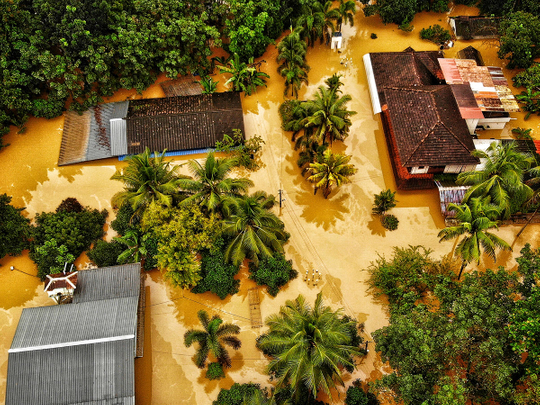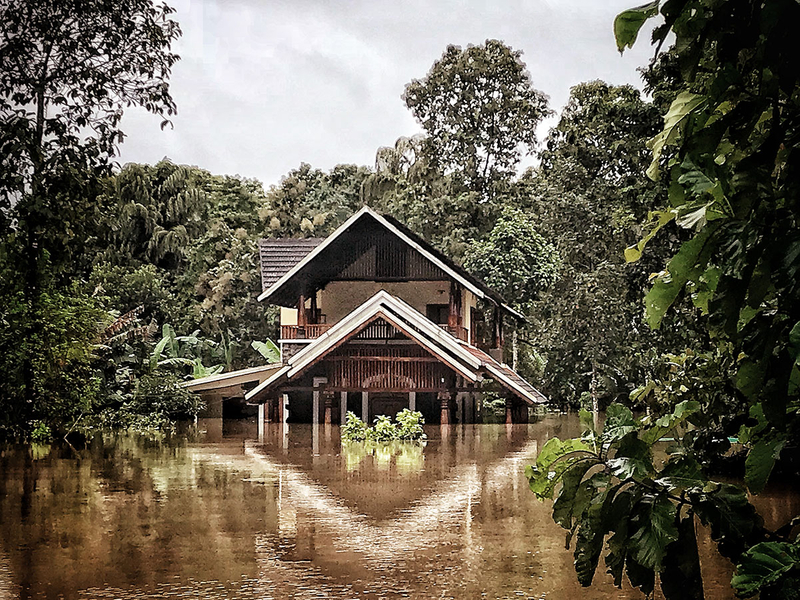
When Tonnit Thomas was a young boy and the rains would canter into his hometown, he would walk down to the river nearby. Once there he would set markers to measure the ebb and flow of the water.
This year, when he took his family on a holiday to Ranni, a small town in Pathanmthitta in the southern Indian state of Kerala, and it began to drizzle, an old anticipation started to build. He took his children; 15-year-old Olivia, 13-year-old Ohanna and three-year-old Oban; to the waterbody that lies 50m away from his new home. [He had bought it only two years earlier.] He showed them how to put markers and how to read them. That afternoon he saw the river swell as the rain became an insistent knocker on her shores. But the Thomas home is about 18 metres above river level; the view just seemed quaint.

When the phone rang at 1.30am that night, Thomas was in for a shock – the river was snaking its way through his lawn and towards his door. “My house is in the corner so I can see one kilometre stretch of the river,” he recalls. At the end of the road, fortunately, was the home of his brother.
He woke up his wife, Renu, and their children and began to wade. “Everything was still packed – so I took the bags down and by that time the water was almost reaching inside my house, so I had to jump out. Somehow I managed to come down with my younger [child] on my head, the girls on both the sides….we floated [using] trees [as handholds]. And managed to get into my brother’s house, which is a little higher. It was, I think, about 2.30 in the morning. The power [had] gone off the [previous] morning.”
I looked back and saw my house drowning.
Having deposited their children at his sibling’s, Tonnit and Renu decided to head home; to salvage what they could. At the end of the exercise, he was reminded again of his childhood days – perhaps not in the most pleasant way. “I was born and brought up there so you know the [safe] mark, the push [of the river]. We realised the water was coming up.”
When the couple made it back to their children, it was 7.30-8 in the morning and the water had begun to lap at his brother’s doorway. “We have kids and stuff,” he says; they began to move things up to the second floor.
An hour later, exhausted and knee deep in water, they began to realise that waiting it out here is not an option. An old house stood at the top of the hill – a mansion built to withstand another storm in the state’s younger days. They began to trudge up the mound. “It’s a fully forested area and uphill,” he says.
Spurred on by screaming neighbours they got up to the house only to mount a rescue operation for those left behind. At the end of it, 21 people stayed in the house for 15 days. “It was like a reunion actually, especially for the kids.” And while the electricity stayed off and the only water source for three-four kilometres was a well, there were no brawls, he says. “So from the oldest person to the youngest kid has to stand [near] the well and carry the buckets, trying to use the water,” he says, recalling the united group.
Four days later, when the rain had abated, the cheery crew went down the road…to tears and ruin. “When we went down after four days and saw the houses that’s when we actually broke down. Every house was gone. My brother’s house was broken into two; it just collapsed, because it was about [a] 60-70-year-old house. And because my house and three four other houses were extremely close to the water – the damage was not on a structural level – it was thick concrete – but the [clay] mud [was everywhere].”
The river had slathered everything with mud and grime, and leaves were found floating in desperate little puddles around homes. “We took 15 days with each house with 10-15 people to wash it, because [of the] dirt.”
“Dirt [was] everywhere; in pipes, in wiring, [from] my fridge to washing machine [etc].”
On a macro level, the shops had been washed away – “When I needed to go to an ATM I had to go 50km up. All the notes were fully soggy,” he says. “That entire Ranni [was] gone.”
Once the roads began to open up, cousins from near and far came bearing food and portable chargers. And with the internet came the pings – from NRIs in the UAE, in America, in Europe on Facebook and Twitter – frantic for word of their relatives.
“So that’s one big learning; first connect with people. Know your neighbourhood, your surroundings,” he says. Having a way to get in touch with your neighbours – and through them your family - back home can give you a sense of relief in troubled times.
And then came the return to real life. “To clean this up you need good manpower. To get manpower there is a problem and every house has its own problem, so nobody will [spare hands] to fix your place. Secondly, the [getting] the right equipment to do this [is an issue], because most of the houses [do] not have any kind of pressure pumps and all. So we had to hire generators from other cities to come in and do it.”
Thomas calls the episode a great educator. He gives the example of his children. “They can sleep anywhere, they can eat anything. They don’t care. I was quite shocked the other day; I went to pick up their school uniform. Normally I pick up three-four sets for each of them. This time they said, ‘No, we need only two’. I said, ‘why?’ They said, ‘no we don’t need anything extra’,” he says.
The town, on the other hand, has found a new way to make use of its natural resources. Mud that once caked walls and inundated homes has been gathered and is being used to forge new, cheaper and – hopefully – more durable bricks. Engineers from Tamil Nadu have stepped in to help with the technology.
Thomas is working on a book that will catalogue this ‘great flood’.
Ranni works on being whole; the people taking their cue from the river are moving on.
Practical lessons
Tonnit Thomas says his schoolwork finally came in handy. Using the principal of buoyancy, for instance, he saved some of his electricals. “ I have a lot of wooden stuff, which I kept on top. So the wooden stuff normally floats. So something you keep on top [of that] it doesn’t get spoilt. So I saved so many things like that. My fridge got saved because I kept it on top of my [wooden] dining table. It’s actually an education.”












